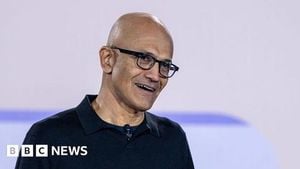On December 10, 2024, Google’s parent company, Alphabet, became the center of attention on Wall Street as its shares surged by nearly 6% following the announcement of its latest quantum computing chip named Willow. This development has been touted as groundbreaking, fueling speculation about the future of quantum technology and its potential applications.
According to company officials, the Willow chip has managed to solve complex computing problems at unprecedented speeds. Remarkably, it can complete calculations within five minutes—tasks which would otherwise take classical computers around 10 septillion years to solve, far exceeding the age of the universe itself. Google CEO Sundar Pichai expressed excitement over this leap, referring to Willow as “an important step” toward creating practical and efficient quantum computers capable of tackling significant challenges across various sectors.
The quest for quantum computing excellence is fueled by the desire to develop systems far faster than current silicon-based technologies. Unlike conventional computers, which operate on bits as the smallest unit of data (0s or 1s), quantum computers leverage the power of quantum bits or qubits. While qubits allow for immensely faster processing, they come with their own set of challenges, primarily related to accuracy and error rates.
Historically, increasing the number of qubits has meant increasing the likelihood of errors, making it difficult to construct reliable quantum systems. That’s where Google claims to have made substantial advancements. With the Willow chip, Alphabet asserts it has discovered innovative ways to connect qubits so errors diminish even as more qubits are involved. The chip integrates real-time error correction measures which could lead to significant improvements not just in computational efficiency but also scalability.
Despite the enthusiasm surrounding Willow, not all experts are on board with the idea of heralding it as the ultimate solution to computing issues. Allan Woodward, Professor at the University of Surrey and notable computing expert, cautioned against overblowing this single milestone. While he believes quantum computers will outperform classical ones for specific tasks, he emphasized the importance of perspective when evaluating such breakthroughs. “One has to be careful not to compare apples and oranges,” Woodward cautioned, reminding enthusiasts of the longer road still facing quantum computing development.
Investors quickly reacted to Google’s announcement, elevting Alphabet's share price to its highest point since July 2024. Even though Alphabet's stock had been under some pressure due to the looming threat of antitrust actions against Google’s search dominance, the positive news around Willow helped to re-invigorate investor confidence. Analysts speculate this newfound interest shows promise for not just Alphabet’s financials but also the broader tech market.
The rapid advancements showcased through the Willow chip could have far-reaching consequences for multiple industries, including fields such as finance, healthcare, and energy. Pichai highlighted prospective applications like drug discovery, fusion energy development, and battery design—each of which stands to benefit significantly from higher computational speeds and capabilities.
Nonetheless, details about real-world applications of Willow remain scarce. Google didn’t present conclusive examples of how this technology might be rolled out or integrated across various sectors, leaving some potential use cases clouded by uncertainty. Technology observers are curious as to how quickly these theoretical advantages might translate to commercial products and solutions.
Yet, beyond Google, the race for quantum computing supremacy is heating up, with companies such as Microsoft also making headways. Earlier this year, Microsoft collaborated with Quantinuum to achieve reliability improvements, signifying serious competitive efforts within the field. This competitive edge could push both companies to strengthen their positions within the tech sector significantly.
Colin Sebastian, analyst at Baird, remarked on Willow's potential impact, emphasizing how this development is pivotal for the forthcoming commercialization of quantum computing technologies: “Willow will likely have significant ramifications for various industries, from national security to healthcare.” Such predictions align with visions of technology solving today's most pressing challenges through innovative methodologies.
Meanwhile, the quantum computing niche is still fraught with challenges. While much excitement surrounds the technological advances, experts are alerting investors and technology enthusiasts alike to maintain realistic expectations. Willow can be viewed as one dramatic leap forward, but the path toward universally reliable quantum computing is still likely riddled with hurdles. The reliability of qubits and their practical application in everyday computing remains uncertain until substantial progress is made.
Overall, Google's Willow chip could signal the dawn of a new computing era, one where problems previously thought insurmountable by classical systems could finally be addressed. If nothing else, this milestone amplifies the conversation around quantum computing and the monumental potential it holds for the future. Though the exact timeline for commercial viability remains uncertain, one thing is sure—All eyes will be on Alphabet as it navigates the next steps along this quantum frontier.



